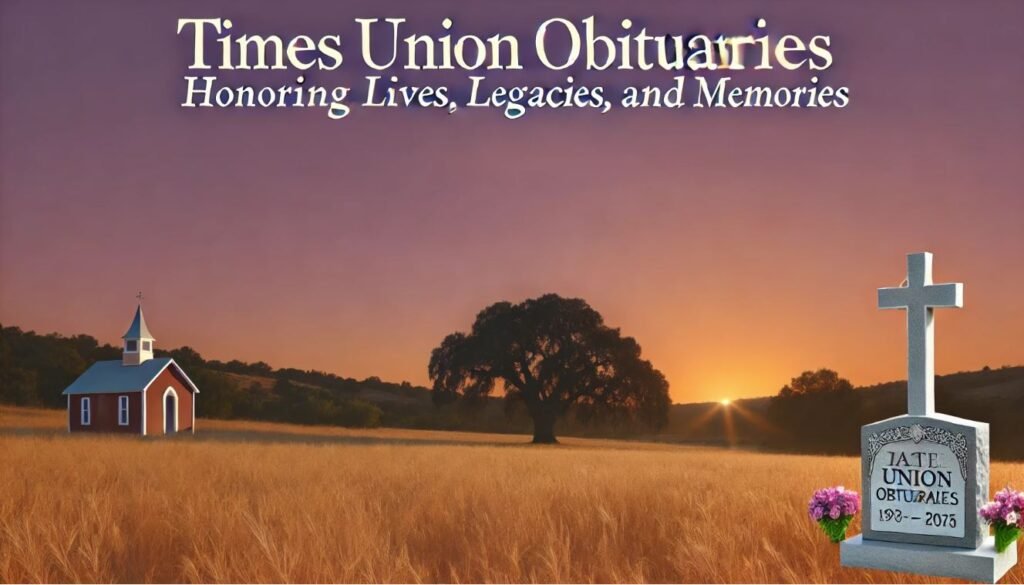Times Union Obituaries: Honoring Lives, Legacies, and Memories

In this blog post, we’ll explore what Times Union obituaries are, how they work, and why they play such an essential role in preserving memories
When someone passes away, their memory lives on through the stories and moments they shared with others. Times Union obituaries provide a platform to honor those we’ve lost while giving family and friends a space to reflect, remember, and pay their respects. Whether you’re looking to learn about someone’s life, connect with community members, or share a legacy, Times Union obituaries are a valuable resource.
In this blog post, we’ll explore what Times Union obituaries are, how they work, and why they play such an essential role in preserving memories. Let’s dive in.
What Are Times Union Obituaries?
Times Union necrologies are published notices that advertise the death of an existent. These notices generally include crucial details about the departed, similar as their name, age, date of end, and information about burial services. further than just adverts, They frequently tell the story of a person’s life, pressing their achievements, heartstrings, and connections.
For readers, these obituaries serve as a way to stay informed about losses in the community. For families, they’re a means of sharing cherished memories and inviting loved ones to honor the deceased.
Why Are Obituaries Important?
Obituaries go beyond listing facts; they encapsulate the essence of someone’s life. Here’s why they matter:
- Honoring the Deceased
An obituary celebrates a person’s life, from their milestones to the small joys that made them unique. It’s a way to honor their memory publicly. - Connecting Communities
Obituaries bring communities together. By sharing information about someone’s passing, they provide an opportunity for friends, neighbors, and acquaintances to offer condolences or attend services. - Preserving Legacies
Through heartfelt words and shared memories, obituaries ensure that a person’s legacy lives on. They become a part of history, accessible to future generations. - Providing Closure
For grieving families and friends, publishing an obituary can be a step toward healing. It’s a way to share their loss and find support.
How to Find Times Union Obituaries
If you’re looking for obituaries published in the Times Union, here’s how you can access them:
Online Archives
The Times Union website features an obituary section where you can browse recent and past notices. The search tool allows you to filter results by name, date, or keyword, making it easy to find specific entries.
Printed Editions
For those who prefer print, Times Union obituaries are also featured in the newspaper. You can pick up a copy at local retailers or subscribe for home delivery.
Community Resources
Local libraries and historical societies often archive newspaper editions, including obituaries. This can be especially useful for researching family history or genealogy.
Writing an Obituary: Tips for Families
Crafting an obituary may feel overwhelming, especially during a time of loss. Here are some tips to help:
- Start with the Basics
Include essential details like the full name of the deceased, their age, and the date of passing. - Share Their Story
Highlight what made them special. Mention their passions, career achievements, family relationships, and contributions to the community. - Provide Service Details
Include information about any funeral or memorial services so that others can pay their respects. - Keep It Personal
Use warm, heartfelt language that reflects the deceased’s personality. Share anecdotes or quotes that capture their spirit. - Consider a Photo
Adding a photo can make the obituary more personal and relatable. Choose an image that reflects their best moments.
How Times Union Obituaries Serve the Community
The Times Union doesn’t just publish obituaries—it fosters a sense of connection. By providing a space for families to share their loved ones’ stories, it helps create a shared history for the region. Readers often discover connections they didn’t know existed, deepening their ties to the community.
In today’s digital age, Times Union obituaries also act as a bridge between the past and present. They’re easily shareable online, ensuring that even distant relatives and friends can stay informed and pay their respects.
Conclusion
Times Union obituaries play a vital role in honoring lives and bringing people together. They’re more than announcements they’re a celebration of legacies, a source of community support, and a lasting tribute to those we’ve lost. Whether you’re reading them to remember someone or writing one to share a loved one’s story, obituaries hold a special place in our lives.
FAQs About Times Union Obituaries
1. How can I submit an obituary to the Times Union?
You can submit an obituary by contacting the Times Union’s obituary department. Details about submission fees and guidelines are available on their website.
2. Are Times Union obituaries free to access online?
Recent obituaries are usually accessible for free on the Times Union website. However, some archives may require a subscription or fee.
3. Can I include a photo in a Times Union obituary?
Yes, families can include a photo to accompany the obituary. This is often an additional cost but adds a personal touch.
4. What’s the best way to search for a specific obituary?
Use the search function on the Times Union website or visit your local library for archived editions.
5. How long do obituaries stay on the Times Union website?
Obituaries typically remain online for a limited time. For permanent access, consider saving a digital copy or requesting a printed edition.
By understanding the significance of Times Union obituaries, you can appreciate the comfort and connection they bring to families and communities alike.



